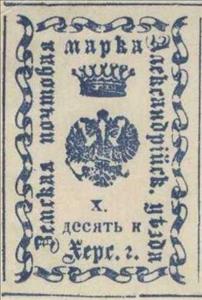Stamp: Crown and eagle in ornamental frame (Russia- Imperial Era Local Issues (Zemstvoes) 1880)
Crown and eagle in ornamental frame (Russia- Imperial Era Local Issues (Zemstvoes) 1880)
01 June (Russia- Imperial Era Local Issues (Zemstvoes) ) within release Alexandria (Kherson Government) goes into circulation Stamp Crown and eagle in ornamental frame face value 10 Russian kopek
| Stamp Crown and eagle in ornamental frame in catalogues | |
|---|---|
| Colnect codes: | Col: RU-ZE ALK-1880-01a |
Stamp is square format.
Type I: Vertical ornaments with wavy sections. 2nd pearl of the crown broken, 6th pearl more or less intact. Always a period after the value. Printed in sheets of 6x3 (first and sixth column) with the bottom right triplet in green, the other triplets in blue. Footnoted in: Schmidt, details three types but does not give individual numbers Footnoted in: Gold-BaumannAlso in the issue Alexandria (Kherson Government):
- Stamp - Crown and eagle in ornamental frame face value 10;
- Tete-Beche - Crown and eagle in ornamental frame face value 2*10;
- Stamp - Crown and eagle in ornamental frame face value 10;
- Stamp - Crown and eagle in ornamental frame face value 10;
- Stamp - Crown and eagle in ornamental frame face value 10;
- Stamp - Crown and eagle in ornamental frame face value 10;
- Stamp - Crown and eagle in ornamental frame face value 10;
- Tete-Beche - Crown and eagle in ornamental frame face value 2*10;
Stamp Crown and eagle in ornamental frame it reflects the thematic directions:
A coat of arms is an heraldic visual design on an escutcheon (i.e. shield), surcoat, or tabard. The coat of arms on an escutcheon forms the central element of the full heraldic achievement which in its whole consists of shield, supporters, crest, and motto. A coat of arms is traditionally unique to an individual person, family (except in the United Kingdom), state, organisation or corporation.
In British heraldry, a coronet is any crown whose bearer is less than sovereign or royal in rank, irrespective of the crown's appearance. In other languages, this distinction is not made, and usually the same word for crown is used irrespective of rank (German: Krone, Dutch: Kroon, Swedish: Krona, French: Couronne, etc.) In this use, the English coronet is a purely technical term for all heraldic images of crowns not used by a sovereign, and implies nothing about the actual shape of the crown depicted. A Coronet is another type of crown, but is reserved for the lower ranks of nobility like Marquesses and Marchionesses, Earls and Countesses, Barons and Baronesses, and some Lords and Ladies. The specific design and attributes of the crown or coronet signifies the hierarchy and ranking of its owner.
Eagle is the common name for the golden eagle, bald eagle, and other birds of prey in the family Accipitridae. Eagles belong to several groups of genera, some of which are closely related. True eagles comprise the genus Aquila. Most of the 68 species of eagles are from Eurasia and Africa. Outside this area, just 14 species can be found—two in North America, nine in Central and South America, and three in Australia.



